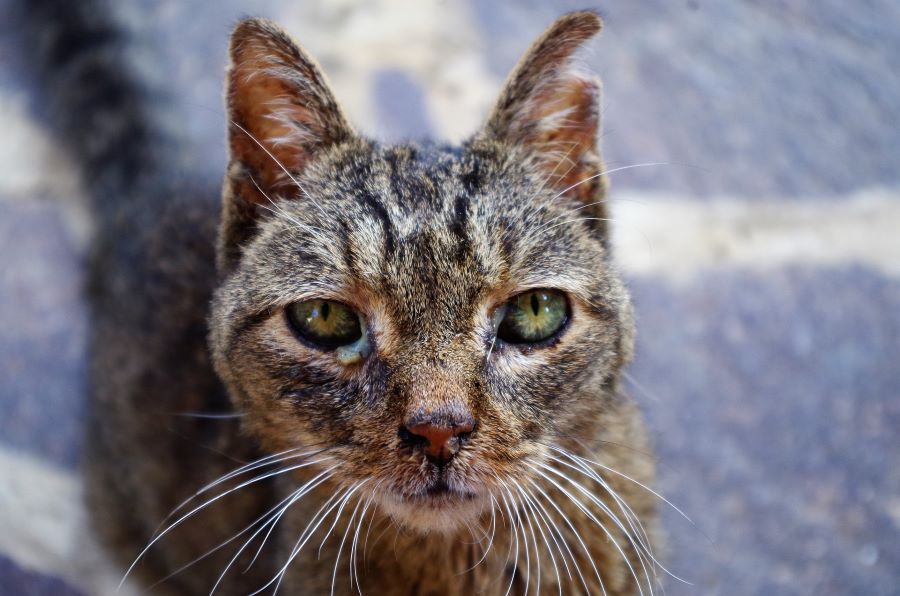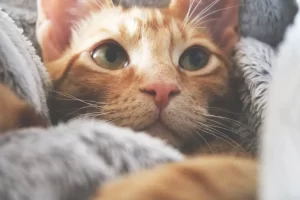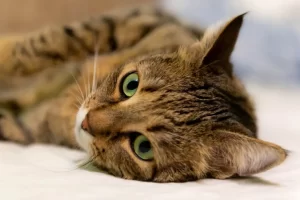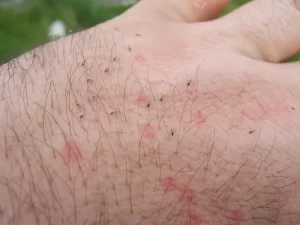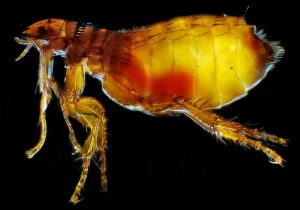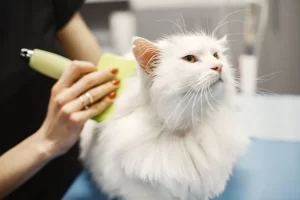Welcome to our comprehensive guide on Feline Herpes Treatment at Home. If you’re a cat owner dealing with a cat diagnosed with feline herpes, you may be seeking effective ways to manage and alleviate the symptoms of this viral disease in the comfort of your own home. Feline herpes is a common viral infection in cats that affects the respiratory system and eyes, causing symptoms such as sneezing, nasal congestion, eye discharge, and fever. While feline herpes cannot be cured, there are various home care and treatment options that can help manage the symptoms and improve your cat’s comfort and quality of life. In this article, we will cover a range of topics related to feline herpes treatment at home, including L-lysine supplementation, nutrition, eye care, steam therapy, immune system support, environmental management, preventing spread to other cats, managing stress, antiviral medications, home remedies, and the difficult decision of euthanasia for severe or chronic cases. We will provide practical tips, instructions, and examples to help you effectively care for your cat with feline herpes in a home environment. Let’s dive in and explore the various ways you can provide compassionate care and support for your feline companion with feline herpes.
Table of Contents
ToggleIntroduction to Feline Herpes
Feline herpes, also known as feline viral rhinotracheitis (FVR), is a highly contagious viral infection that affects the upper respiratory tract of cats. It is caused by the feline herpesvirus type 1 (FHV-1) and is a common viral infection among cats, particularly those living in multi-cat environments such as shelters or catteries.
- Causes of Feline Herpes: Feline herpes is caused by the feline herpesvirus type 1 (FHV-1), which is a highly contagious virus that can be easily spread among cats through direct contact with bodily fluids, such as nasal discharge or saliva, from infected cats. Cats can also become infected with FHV-1 through contact with contaminated objects or surfaces, such as food and water bowls, litter boxes, or bedding.
- Transmission of Feline Herpes: Feline herpes can be transmitted among cats through close contact, such as grooming, sneezing, or sharing food and water bowls. The virus can also be spread indirectly through contaminated objects or surfaces, where the virus can survive for a short period of time. Cats that are stressed, have weakened immune systems, or are young or elderly are more susceptible to FHV-1 infection.
Symptoms of Feline Herpes
Feline herpes, or feline viral rhinotracheitis (FVR), can manifest in a variety of symptoms. It’s important for cat owners to be aware of these signs and symptoms, as early detection and management can help prevent the spread of the virus and reduce the severity of the infection.
Common signs and symptoms of feline herpes include:
- Sneezing: Cats infected with feline herpes may sneeze frequently, often accompanied by nasal discharge. The discharge may be clear initially, but can become thicker and yellowish or greenish in color as the infection progresses. It might be possible to treat sneezing with cat by using some basic and simple home and natural remedies.
- Nasal Congestion: Cats with FVR may also exhibit nasal congestion or stuffiness, causing them to breathe with their mouths open and make snuffling sounds.
- Eye Discharge: Feline herpes can cause eye discharge, which can range from mild tearing to severe eye discharge that may be thick and cloudy. Cats may also develop conjunctivitis, characterized by redness, swelling, and inflammation of the conjunctiva (the clear membrane that covers the eye).
- Fever: Infected cats may develop a fever, which can cause lethargy, loss of appetite, and decreased activity levels.
- Oral Ulcers: Feline herpes can also cause ulcers in the mouth and tongue, making it painful for cats to eat or groom themselves.
- Respiratory Distress: In severe cases, cats with feline herpes may exhibit respiratory distress, such as rapid or labored breathing, coughing, or wheezing.
Note that not all cats infected with feline herpes may exhibit all of these symptoms, and the severity of the symptoms can vary from mild to severe. Some cats may only show mild signs of sneezing and nasal discharge, while others may develop more severe respiratory and ocular symptoms.
Overview of Home Care and Treatments for Cats with Feline Herpes
While feline herpes is a viral infection that requires veterinary care, there are some home care treatments and remedies that cat owners can use to help manage the symptoms and support their cat’s recovery. It’s important to note that these treatments should be used in conjunction with veterinary guidance and not as a substitute for professional medical care.
- Lysine supplementation: Lysine is an essential amino acid that has been shown to help inhibit the replication of the feline herpes virus. Lysine supplements are available in various forms, including powders, treats, and gels, and can be administered orally to cats. Consult with your veterinarian for the appropriate dosage for your cat’s weight and condition.
- Steam therapy: Steam therapy can help to alleviate nasal congestion in cats with feline herpes. You can create a steamy environment by placing your cat in a bathroom while running a hot shower or using a humidifier in the room where your cat is staying. The warm and moist air can help to loosen nasal secretions and ease breathing.
- Eye cleaning: Cats with eye discharge due to feline herpes may benefit from regular eye cleaning. Use a clean, damp cloth or a sterile saline solution recommended by your veterinarian to gently wipe away any discharge from your cat’s eyes. Be sure to use a separate cloth for each eye to prevent cross-contamination.
- Nutrition: Providing a well-balanced and nutritious diet can help support your cat’s immune system and aid in their recovery from feline herpes. Offer your cat high-quality food that is rich in essential nutrients, such as vitamins A, C, and E, and omega-3 fatty acids, which can help boost the immune system and reduce inflammation.
- Environmental enrichment: Cats with feline herpes may benefit from a stress-free and enriched environment, as stress can weaken the immune system and trigger outbreaks. Provide your cat with a comfortable and cozy space with opportunities for play, exercise, and mental stimulation. This can include toys, scratching posts, hiding spots, and perches to help reduce stress and promote overall well-being.
- Isolation and hygiene: If you have multiple cats and one is infected with feline herpes, it’s important to isolate the infected cat to prevent the spread of the virus. Provide a separate litter box, food, and water bowls for the infected cat, and clean and disinfect these items regularly to minimize the risk of transmission.
- Medication administration: If your veterinarian has prescribed antiviral medication or other medications for your cat’s feline herpes, be sure to follow their instructions carefully for proper administration. This may include oral medications, eye drops, or topical treatments, and it’s important to administer them as directed by your veterinarian.
L-Lysine for Feline Herpes: Managing Symptoms with an Amino Acid Supplement
L-lysine supplementation is a common approach used by cat owners for managing feline herpes symptoms. L-lysine is an essential amino acid that has been shown to have antiviral properties, inhibiting the replication of the feline herpes virus. Many cat owners use L-lysine supplements as part of their cat’s treatment plan for feline herpes.
L-lysine supplements are available in various forms, including powders, treats, and gels, and can be administered orally to cats. The dosage of L-lysine will depend on your cat’s weight and condition, and it’s important to consult with your veterinarian for the appropriate dosage for your cat. Some cat owners may choose to give L-lysine supplements to their cats daily, while others may use them during periods of outbreaks or stress.
When using L-lysine supplements, it’s important to follow the instructions and dosages provided by your veterinarian or the product packaging. Overdosing on L-lysine can potentially cause adverse effects, so it’s crucial to use the correct dosage for your cat’s weight and condition. It’s also important to note that L-lysine supplementation is not a substitute for veterinary care, and it should be used in conjunction with other treatments as prescribed by your veterinarian.
While some studies suggest that L-lysine supplementation may help reduce the severity and duration of feline herpes outbreaks, the efficacy of L-lysine in managing feline herpes symptoms is still a topic of ongoing research and debate among veterinary professionals.
Nourishing Your Cat with Feline Herpes: The Role of Nutrition in Supporting Immune Health
Nutrition plays a crucial role in supporting the immune system of cats with feline herpes. A balanced and nutritious diet can help improve the overall health and resilience of cats, including those with feline herpes, by providing essential nutrients to support their immune system.
When it comes to nutrition for cats with feline herpes, it’s important to ensure that your cat is receiving a complete and balanced diet that meets their specific dietary requirements. This may include feeding your cat a high-quality commercial cat food that is formulated to provide all the necessary nutrients, including protein, vitamins, minerals, and omega-3 fatty acids.
Additionally, incorporating certain immune-boosting ingredients into your cat’s diet may be beneficial. For example, foods rich in antioxidants such as vitamin C and vitamin E, can help support the immune system. Examples of such foods include fresh fruits and vegetables, such as blueberries, broccoli, and spinach. However, it’s important to note that not all human foods are safe for cats, and it’s crucial to consult with your veterinarian before making any dietary changes or offering human foods to your ca
Eye Care for Cats with Feline Herpes
Eye care is an important aspect of managing feline herpes, as the virus often affects the eyes of cats. Here are some tips on how to clean and care for the eyes of cats with feline herpes:
- Use prescribed eye drops or ointments: Your veterinarian may prescribe antiviral eye drops or ointments to help manage the eye symptoms associated with feline herpes. These medications can help reduce eye discharge, redness, and discomfort. It’s important to follow the prescribed dosage and frequency of administration as directed by your veterinarian. Be sure to wash your hands thoroughly before and after administering the eye drops or ointments, and use a clean, sterile applicator or your fingers to avoid contamination.
- Clean the eyes regularly: Cats with feline herpes may develop eye discharge or crust around their eyes. Regular eye cleaning can help remove the discharge and prevent further irritation. You can use a clean, damp cloth or sterile saline solution to gently wipe away the discharge from the corners of the eyes. Avoid using cotton balls or tissues, as they may leave fibers in the eyes and cause further irritation.
- Avoid harsh or irritating substances: When cleaning your cat’s eyes, it’s important to avoid using harsh or irritating substances, such as alcohol-based solutions or human eye drops, as they can further irritate the eyes. Stick to gentle, veterinary-recommended eye cleansers or sterile saline solution, and always consult with your veterinarian for specific recommendations.
Using Steam Therapy to Relieve Nasal Congestion in Cats with Feline Herpes
Steam therapy is a simple and effective home treatment for managing nasal congestion in cats with feline herpes. Here’s how you can use steam therapy to help alleviate nasal congestion in your cat:
- Create a steamy environment: One way to create a steamy environment for your cat is to place them in a bathroom while running a hot shower. Close the door to trap the steam in the room. Alternatively, you can use a humidifier in the room where your cat is staying. Set the humidifier to a comfortable humidity level, typically between 40-50%, and let it run for 15-20 minutes.
- Monitor your cat: Keep a close eye on your cat while they are in the steamy environment. Some cats may feel uncomfortable or anxious in a confined space or with the noise of running water. If your cat shows signs of distress, such as excessive vocalization, panting, or attempting to escape, remove them from the steamy environment immediately.
- Be cautious with hot water and steam: Hot water and steam can cause burns, so make sure the water temperature is not too hot and the steam is not too intense. Always test the water temperature and adjust accordingly before bringing your cat into the steamy environment. Keep your cat at a safe distance from hot water or steam to prevent accidental burns.
- Monitor your cat’s breathing: While in the steamy environment, observe your cat’s breathing. If your cat shows signs of difficulty breathing, such as rapid or labored breathing, wheezing, or choking, remove them from the steamy environment immediately and consult your veterinarian for further evaluation.
- Provide plenty of water: Steam therapy can help to loosen nasal secretions, which may lead to increased fluid intake. Make sure your cat has access to plenty of fresh water to stay hydrated during and after steam therapy.
- Avoid using essential oils or medications: When using steam therapy for cats with feline herpes, it’s important to avoid adding any essential oils or medications to the steam. Cats are sensitive to many substances, and these may cause respiratory irritation or other adverse reactions.
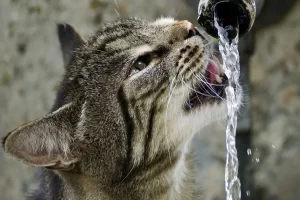
The Importance of Hydration for Cats with Feline Herpes
Hydration is a crucial aspect of managing feline herpes at home. Adequate hydration helps to support the immune system and maintain overall health in cats, including those with feline herpes. Here are some important considerations for keeping your cat with feline herpes well-hydrated:
- Provide clean, fresh water: Make sure your cat has access to clean, fresh water at all times. Cats with feline herpes may experience increased nasal discharge and sneezing, which can lead to dehydration if not properly managed. Regularly check and refill your cat’s water bowl to ensure they have an adequate supply of water available.
- Consider wet food: Wet or canned food can provide additional moisture to your cat’s diet, helping to keep them hydrated. Cats are notorious for not drinking enough water, so incorporating wet food into their diet can be beneficial. Consult your veterinarian for recommendations on appropriate wet food options for your cat, taking into account their age, health status, and dietary needs.
- Use a water fountain: Some cats prefer to drink moving water, and a water fountain can entice them to drink more water. Water fountains provide a continuous flow of fresh water, which can help encourage cats to drink more and stay hydrated.
- Monitor for signs of dehydration: Keep an eye out for signs of dehydration in your cat, such as lethargy, sunken eyes, dry mouth, decreased skin elasticity, or dark, concentrated urine. If you notice any of these signs, contact your veterinarian immediately for evaluation and appropriate treatment.
Environmental Management for Cats with Feline Herpes
Managing the living environment of cats with feline herpes can be an important aspect of their home care. A stress-free and enriched environment can help reduce the frequency and severity of feline herpes outbreaks. Here are some tips for environmental management:
- Minimize stressors: Cats with feline herpes are more susceptible to outbreaks during times of stress. Minimize stressors in your cat’s living environment by providing a calm and stable home. Avoid changes in routine, loud noises, or sudden movements that can trigger stress in your cat. Provide a safe space for your cat to retreat to when they feel stressed or anxious.
- Indoor living: Keeping cats with feline herpes indoors can help reduce their exposure to potential triggers and pathogens that can worsen their symptoms. Indoor living can also help protect them from environmental stressors such as extreme weather conditions, fights with other animals, and exposure to contagious diseases.
- Enrichment activities: Providing environmental enrichment activities can help keep your cat mentally stimulated and reduce stress. Offer toys, scratching posts, hiding spots, and climbing opportunities for your cat. Interactive toys that encourage physical and mental activity can also help distract your cat from focusing on their symptoms.
- Cleanliness: Maintaining a clean living environment can help reduce the risk of triggering feline herpes outbreaks. Regularly clean and disinfect your cat’s litter box, food and water bowls, and bedding. Keep the living area well-ventilated and free from dust, which can irritate your cat’s respiratory system.
Preventing Spread of Feline Herpes in Multi-Cat Homes
If you have multiple cats in your household and one of them has been diagnosed with feline herpes, it is crucial to take steps to prevent the spread of the virus to other cats. Here are some important tips for preventing the spread of feline herpes:
- Isolation: If one of your cats has been diagnosed with feline herpes, consider isolating the infected cat from the other cats in your household to prevent direct contact and minimize the risk of transmission. This may involve keeping the infected cat in a separate room or area of the house.
- Hygiene practices: Practicing good hygiene is essential to prevent the spread of feline herpes. Wash your hands thoroughly with soap and water before and after handling each cat, especially if one of them has feline herpes. Use separate food and water bowls, litter boxes, and bedding for each cat to prevent sharing of items that may be contaminated with the virus.
- Cleaning and disinfection: Regularly clean and disinfect surfaces and objects that may come into contact with the infected cat’s nasal discharge or saliva, such as food and water bowls, litter boxes, bedding, and toys. Use a veterinary-approved disinfectant that is effective against feline herpes virus.
- Limiting stress: Feline herpes outbreaks can be triggered or exacerbated by stress. Minimize stressors in your multi-cat household, such as changes in routine, introduction of new pets, or overcrowding. Provide ample space, hiding spots, and environmental enrichment to help reduce stress in all your cats.
Stress Management for Cats with Feline Herpes
Stress can exacerbate feline herpes outbreaks, so it’s important to manage stress in cats with this condition. Here are some stress management techniques that can be implemented at home:
- Environmental modifications: Creating a calm and stress-free environment for your cat can help reduce the frequency and severity of feline herpes outbreaks. Provide a quiet and safe space for your cat with access to hiding spots, elevated perches, and comfortable bedding. Minimize exposure to loud noises, excessive light, and other stressors.
- Routine and consistency: Cats thrive on routine and consistency. Establish a regular schedule for feeding, playtime, and litter box cleaning to provide a sense of stability and predictability for your cat. Avoid sudden changes in routine or disruptions to their environment, as this can trigger stress and potentially worsen feline herpes symptoms.
- Interactive playtime: Engage in regular interactive playtime with your cat to provide mental and physical stimulation. Play can help reduce stress, anxiety, and boredom in cats, and promote bonding between you and your feline friend.
- Enrichment activities: Provide environmental enrichment activities to keep your cat mentally and physically engaged. This can include puzzle feeders, scratching posts, cat trees, and toys that encourage natural behaviors such as hunting and exploring. Enrichment activities can help reduce stress and provide a positive outlet for your cat’s energy.
- Calming aids: There are various calming aids available for cats, such as pheromone diffusers, sprays, and collars that release calming pheromones. These pheromones can help create a sense of calm and relaxation for your cat, and may be beneficial in managing stress associated with feline herpes.
- Positive reinforcement training: Positive reinforcement training can help modify undesirable behaviors and reduce stress in cats. Use reward-based training methods to encourage desired behaviors, and avoid punishment or negative reinforcement, as it can increase stress and anxiety in cats.
Complications of Feline Herpes if Left Untreated
Feline herpes can sometimes lead to complications, which may include chronic respiratory issues or ocular complications. Here are some important points to know about managing complications of feline herpes:
- Chronic respiratory issues: Feline herpes can cause chronic respiratory issues in some cats, such as recurrent sneezing, nasal congestion, and coughing. These symptoms may persist even after the acute phase of the infection has resolved. It’s important to work closely with your veterinarian to manage these chronic respiratory issues, which may include ongoing treatment with antiviral medications, anti-inflammatory medications, and supportive care measures such as steam therapy or nebulization to help reduce congestion.
- Ocular complications: Feline herpes can also cause ocular complications, such as conjunctivitis (inflammation of the conjunctiva, the thin membrane covering the eye) or corneal ulcers (open sores on the cornea). These complications can cause discomfort and potential vision issues for affected cats. Treatment may include topical ophthalmic medications, such as antiviral eye drops or ointments, antibiotic eye drops to manage secondary bacterial infections, and supportive care measures to keep the eyes clean and moisturized.
Making Tough Choices: Considering Euthanasia for Cats with Severe Feline Herpes Symptoms
When caring for a cat with feline herpes, it’s important to be aware that in some cases, the disease may progress to severe or chronic symptoms that do not respond to treatment. As a responsible cat owner, it’s crucial to be prepared to make difficult decisions, including the possibility of euthanasia, in consultation with your veterinarian.
Here are some considerations to keep in mind when contemplating euthanasia for a cat with severe or chronic feline herpes symptoms:
- Quality of life: Assessing your cat’s quality of life is essential. If your cat is experiencing severe pain, difficulty breathing, constant discomfort, or a significant decline in overall well-being, it may be humane to consider euthanasia to prevent further suffering.
- Prognosis: Consider the prognosis of your cat’s condition. If the feline herpes has progressed to a severe stage with little to no response to treatment, and the prognosis for a meaningful recovery is poor, euthanasia may be a humane option to prevent prolonged suffering.
- Financial and emotional considerations: Consider the financial and emotional toll of ongoing treatment for severe or chronic feline herpes symptoms. If the financial burden becomes overwhelming, or if the emotional toll on both you and your cat becomes too distressing, euthanasia may be a difficult but compassionate decision.

